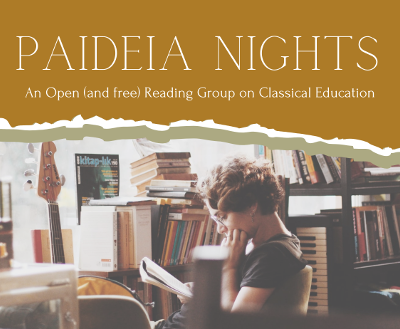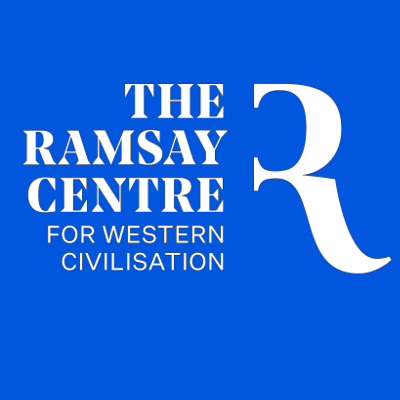For those who have had the privilege of a classical education or are in some way involved in teaching or learning about it, there's little need for outside evidence to convict us of the efficacy of this pedagogy and the multiform curricula associated with it. We are very aware of the great blessings it provides, maturing young people in virtue, responsible citizenship, academic and sporting abilities, and their relationship with God and His Creation. Nevertheless, it is heartening to know that there have been several professional research studies conducted into classical schools and the results of these are undeniably positive; in fact, rather enviable for most mainstream educational institutions.
Below is a summary of four recent studies of student outcomes from classical schools in the United States. For full details on the schools investigated, their curriculum offerings, student cohorts and other factors, please refer to the studies themselves.
Institute for Catholic Liberal Education (ICLE). (2023). The joy of education: An initial study of Catholic liberal arts schools, https://catholicliberaleducation.org/joy-of-education-report/.
This preliminary study is based on survey data from 70 schools under the ICLE banner, involving schools with varied enrolment numbers (some as low as 20, others as high as 822), P-12 grades and ethnic backgrounds. Some of these schools have only recently transitioned from mainstream education to offering predominantly a liberal arts curriculum.
The survey data reveals the following:
- nearly two-thirds of respondents report that engagement in faith life has improved since adopting classical education;
- 82% report that staff morale and engagement has increased;
- 85% report that student engagement has increased;
- 43% indicate an increase in assessment scores, 38% report no change, and 19% indicate a decrease; and
- most schools report an increase in enrolments since transitioning to classical education.
McCoy, Brandon. (2021). Classical education: An attractive school choice for parents. Manhattan Institute. https://manhattan.institute/article/classical-education-an-attractive-school-choice-for-parents/.
Following an overview of the principles and pedagogy of classical education, this study surveys three classical charter schools: Nashville Classical (TN), South Bronx Classical (NY) and Washington Latin (DC).
Nashville Classical opened its doors in 2013 in a city where literacy and proficiency rates were consistently below the national average. Its student cohort is diverse, including black, Hispanic and economically disadvantaged backgrounds. 2019 English Language Arts (ELA) proficiency test results show students at Nashville Classical scored 23.3% higher than the most popular metropolitan schools (Davidson County) and 15.5% better than the state average. For mathematics, they were 34.6% better than Davidson County and 23.7% higher than the state average. Students achieved consistently better grades irrespective of their demographic background.

South Bronx Classical was specifically established in 2006 to provide some of New York City’s most disadvantaged students with a liberal arts education, in a catchment region that ranks among the state’s lowest counties on mathematics assessment and below average on ELA proficiency. As the table below illustrates, students consistently scored between 55 and 65 marks higher on their ELA and mathematics tests from 1st-3rd year high school and from a range of socio-economic and ethnic backgrounds.
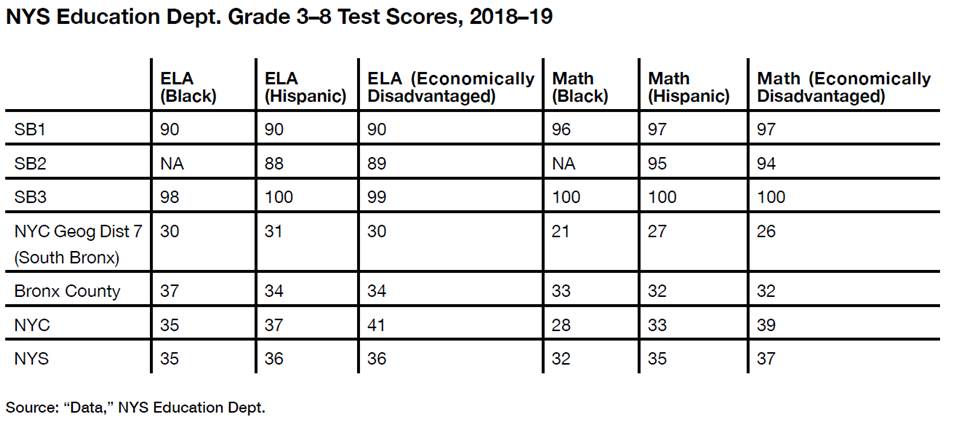
Washington’s standardised Partnership for Assessment of Readiness for College and Careers (PARCC) exams shows strong gains in English and Humanities compared to the state average. In Mathematics, there was either parity or a small increase.

Goodwin, David and David Sikkink. (2020). Good soil and seven outcomes: A Comparative Study of ACCS Alumni Life Outcomes. The Classical Difference. https://classicaldifference.com/wp-content/uploads/2020/06/The-Classical-Difference-Good-Soil-7-outcomes-full-research-report-Draft-3-28-2020.pdf
This extensive study carried out by the University of Notre Dame surveyed 300 alumni of schools that are part of the Association of Classical Christian Schools (ACCS). Most of the students graduated between 1995 and 2012. To draw comparative conclusions, student sample data was also surveyed from public schools, private secular schools, private religious schools (Catholic and Evangelical) and homeschoolers.
The major area of focus was the degree to which schooling prepared a young person for life, based on seven outcomes: college and career life; positive and confident outlook on life; following Christian practices, such as Bible reading or attending church services; following a general Christian lifestyle; holding traditional and conservative values; being independent thinkers; and capacity to influence others around them.
The graph below illustrates the strong performance of ACCS schools in delivering these outcomes.
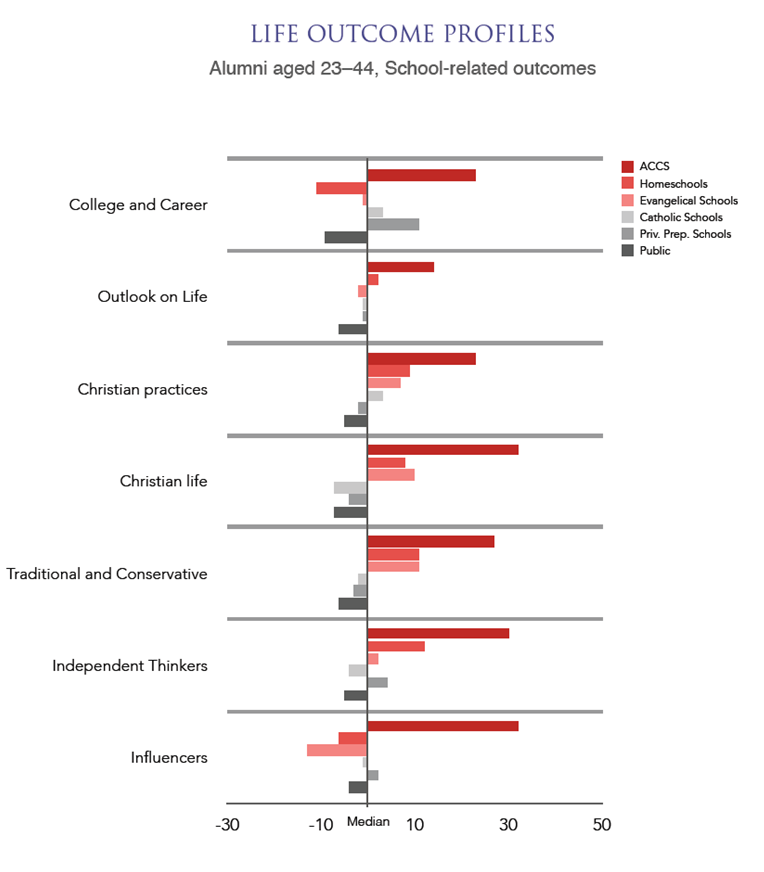
A comparative study of SAT scores similarly demonstrated better outcomes for ACCS graduates.
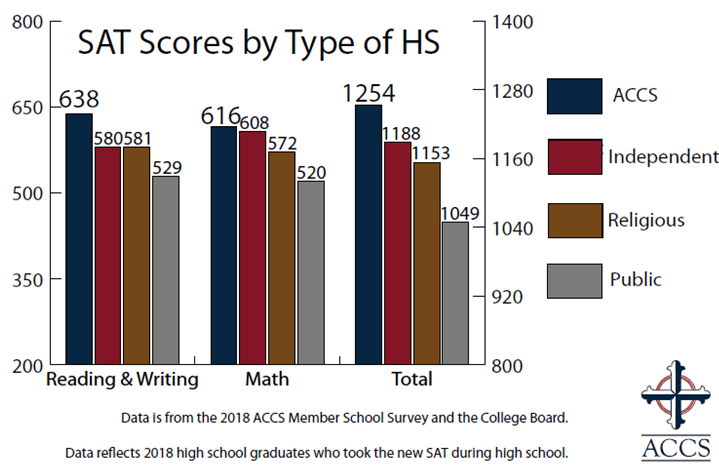
The authors of the study conclude that, with respect to both “spiritual and life” outcomes and “world-impact” outcomes, young people who attended ACCS institutions were far in advance of those graduating from other categories of schools.
Vaughan, Christy Anne. (2020). “Differences of Mean Scores on the Preliminary Scholastic Aptitude Test (PSAT) for Classical Christian Schools Compared to Non-Classical Christian Schools.” Journal of Research on Christian Education 28:3, 286-308. https://doi.org/10.1080/10656219.2019.1704326.
This article summarises a study of Preliminary Scholastic Aptitude Test (PSAT) data from private Christian schools that either offer a classical education or do not, aiming to complete a comparative study. The PSAT is a standardised practice test to help students qualify for college admissions and the National Merit Scholarship in the United States. Both sets of schools have student cohorts from wide-ranging demographic backgrounds.

The author concludes that a “statistically significant difference found in academic performance on PSAT mean reading, math and writing scores for Classical Christian private schools compared to non-Classical Christian private schools [can be] attributed to instructional method… Additionally, higher levels of both reading and writing skills combine with a sufficient base of knowledge to aid in development of inferential and critical thinking/higher-level cognitive skills” (p. 302).




